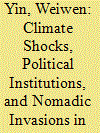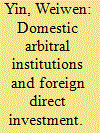| Srl | Item |
| 1 |
ID:
174721


|
|
|
|
|
| Summary/Abstract |
While a large literature argues negative climate shocks can trigger conflicts, recent findings suggest moderate climatic conditions lead to war. This article proposes a conditional theory by incorporating political institution as a moderating variable. I argue that, under the impact of negative climate shocks, centralized societies can mobilize more resources for war, compared to decentralized societies. Thus, the former is more likely to resort to well-organized plundering to address the scarcity problem caused by detrimental climate shocks. Besides, centralized societies have little incentive to plunder when the climatic conditions are moderate, as they can collect taxes regularly through centralized institutions. A comparison between the more centralized Manchurian and the less centralized Mongols on their conflictual behavior serves as an empirical test. I find that temperature was negatively associated with the probability of Manchurian invasion after they embraced centralization but had a positive effect on the likelihood of Mongol invasion.
|
|
|
|
|
|
|
|
|
|
|
|
|
|
|
|
| 2 |
ID:
186179


|
|
|
|
|
| Summary/Abstract |
Existing literature focuses on how domestic and international institutions address investor–state disputes and attract foreign direct investment (FDI). However, contractual disputes between foreign and domestic firms are largely neglected. For foreign investors, dispute resolution mechanisms that can effectively resolve contractual disputes are very important as well. In this article, I examine the effect of institutions that conduct arbitrations for disputes between foreign and domestic firms on FDI inflows. Focusing on the within-country variation of China, I find that provinces with CIETAC (China International Economic and Trade Arbitration Commission) agencies receive a higher level of FDI. These agencies attract FDI because they can credibly signal that local governments are truly willing to treat foreign investors fairly when they have disputes with local firms. In sum, this article highlights an institutional variable that has received little attention in the literature on the politics of FDI.
|
|
|
|
|
|
|
|
|
|
|
|
|
|
|
|